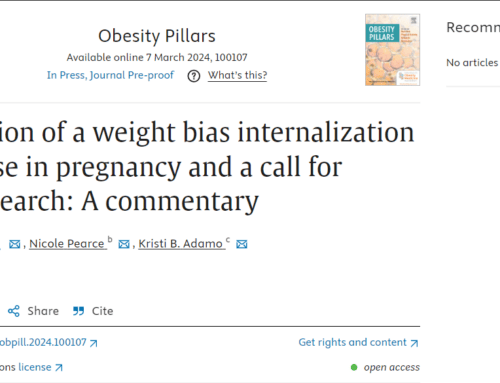Our Ask an Expert series is your opportunity to engage with world-class obesity experts at Obesity Canada. Each month, we will solicit questions for some of Canada’s top researchers and health professionals to answer. This month, it’s month’s it is Dr. Michael Vallis, a registered health psychologist practicing in Halifax. He is a Health Behaviour Change Consultant and Associate Professor in Family Medicine at Dalhousie University. He obtained his Ph.D. and M.A from the University of Western Ontario, London, and his B. Sc. From Dalhousie University. His main area of expertise is adult health psychology, with an emphasis on diabetes, obesity, cardiovascular risk and gastroenterology. He has worked in the public health system for 35 years and is now working as a consultant and doing private practice.
Q1A. Dr. Vallis, as someone who has tried and tried to change over many years, always coming back to old behaviors, my question to you is it possible to truly change behavior forever? Specifically, with eating, can someone really change eating behavior forever and if so, how?
Q1B. Dr. Vallis, I have made weight-loss related New Years resolutions every year for as long as I can remember and always come out of the gate really good but it always seems to fall off the wagon in a month or two, then I spiral further down and end the year either back where I was or further away from my goal. Do you have any tips or advice for people trying to make long-term changes?
Dr. Vallis: I have grouped these two questions together because they address the same issue: is lasting change possible? As reflected in these comments, most people experience a “two steps forward, two steps backward” experience when it comes to changing behaviour and changing weight-related behaviours in particular (because the body resists weight loss). The answer is: Yes, lasting change is possible, but it is not easy and requires the right mindset and the right tools.
I have spent over 35 years as a clinical academic psychologist wrestling with this issue. Given what I have learned, I feel comfortable talking about lasting change as being reflected by three issues. If a person is to be successful in lasting change, what are the stepping stones on this success journey? There are three, and they apply to change in general. I will also make several comments about changing weight-related behaviours after I explain these three steps.
Stepping stone 1: Adherence! Change requires a person to keep doing the behaviours. While this sounds obvious, I find it remarkable how much effort people put into behaviours that they cannot sustain. I think this happens because individuals look outside of themselves for a “program” or a “treatment” for their weight problems. So, people join a gym, enroll in a diet program, ask professionals to make up a program for them, etc. They then try to follow these programs. I think programs need to fit the person, and the other way around. So, to be successful with this step you need to find a pathway that you can adhere to. Most often, this involves small, nondramatic steps. I will remind readers of the proverb “slow and steady wins the race”. Please change what you are doing so that you can stick to what you are doing. Adherence is success. And once you have been successful with one behaviour you can always set your sights on another!
Stepping stone 2: Self-efficacy. This is a complicated psychological term that refers to a person’s confidence in their ability to engage in a specific behaviour, within a specific context and timeframe, and in the face of specific barriers (notice the bolding). So, to achieve this, as you find behaviours that you are willing to commit to (adherence) you focus on developing strategies to overcome barriers to that behaviour. Becoming confident that you can stay on course even when there are roadblocks is self-efficacy.
Stepping stone 3: Intrinsic motivation. Humans are values-driven. We will work hard to stay true to the important values we hold. As the journey with health behaviours continues the people who are able to maintain change are able to develop personal, meaningful reasons to do the hard work of change. I like to use the phrases “anything worth having is worth working for”, and “it’s not having what you want, but wanting what you have”.
I mentioned above that I had some weight specific comments. It is critical, when supporting people in achieving healthy weight related behaviours, that the issues of expectations, self-esteem and bias be addressed. Weight is not a behaviour and weight loss is not behavioural control. The goals should be about achieving healthy behaviours and improving health, function and quality of life. I want also to emphasize that changing eating behaviour is complicated because eating is strongly connected to emotions and relationships. So, if your goal is to change your eating behaviour, consider figuring out the emotional and relational aspects of food. If you are an emotional eater, what other emotion management strategies can you use? If all your friends eat unhealthy, how can you gravitate toward those that share you goals and values?
Q2. I find that I often feel like I am alone in my mission to control my weight. I have a hard time speaking to my family, friends and even my doctor because I feel like this is my fault and I am ashamed of all the times I have failed to gain control (most of them don’t have issues with their weight) but I really feel like I need support. Do you have any advice on starting the conversation of asking for help or support?
Dr. Vallis: This is a very important issue. We know that changing behaviour is much easier if the person wanting change has support from others. Within the field of achieving healthy weight, this is a major concern. Society in general, including health care providers and family, have generally taken the view that weight falls under direct behavioural control. Those of us in the obesity field have taken to calling this the “eat less, move more” myth. The mantra from others is success is possible if you eat less and move more; it is all under your control. This is, sadly, the basis of the bias against obesity that has been so clearly documented.
One way we understand why this bias is so prevalent is to look at some of our cultural beliefs. In particular, three issues here are noteworthy. First, most of us would tell our children that they can be whatever they want to be, they just have to believe in themselves and work for it. In the context of child raising this may help build confidence and self-esteem, but it leads to the implicit belief of individual controlability. That is, people take the attitude that if you are in an unfortunate situation it is because you are not working hard enough. We know that weight is not under direct behavioural control; in fact, all you can control is your behaviour, and weight is not a behaviour. Second, one of our main drives is to understand the world around us. When there is a tragedy in someone’s life the three main questions that many people ask are: Why? Why? Why? We psychologists call this the Just World Hypothesis, in which we tend to think good things happen to good people, and that bad things happen to bad people. Again, this inappropriately contributes to the bias that we see. Third, media is a huge source of bias as it presents people living with overweight and obesity in a negative light compared to people without overweight or obesity. In recognition of this question I would also add that doctors tend to focus on what they can control. So, if a doctor cannot do anything about a problem, they have a tendency to not focus on it.
So now to the meat of the question; how to start a conversation. With your healthcare providers I would encourage you to raise several questions with them, as follows:
“Would it be ok if we talked about my weight and how it affects my health?”
“Could I ask you to help me figure out how I can be more successful in the efforts I put into achieving a healthier weight?”
“I get the impression that you are critical of me because of my weight; does this concern you?
Notice that that last question is a bit pushy. I raise it because in my conversations with MDs when I ask them this straight up, almost everyone reacts strongly to say that they very much care about the impact they have on their patients and they confirm their desire to be helpful.
Regarding friends and family, I would encourage you to use an assertive communication technique we call the “broken record”; this means finding the words (the fewer the better) that represent what you want to say and then calmly and politely repeating the exact same phrase over and over, without changing the words or the tone (polite but clear). It often takes people who are to not listening to you 5-7 times hearing something before it sinks in. S
So, you could say something like:
“If you are trying to be supportive, would you be interested in hearing about the science behind obesity and weight?”
“Weight is not easy to control; my focus is on making the healthiest choices I can; that’s the best anyone can do”
I would also encourage you to look at your circle of friends/acquaintances and try to categorize who’s on your side and who isn’t. It is hard at first, but try to get closer to the supportive people and further away from the unsupportive people.
Q3. Do you have any suggestions for books, readings or resources for people interested in behavior change and weight loss?
As a psychologist I am not a fan of recommending specific books. I find it is kind of like choosing a blind date for someone. You will pick someone (or some book) that makes sense to you, that you like, and that you find helpful. But, everyone is different. My strategy with this question is to suggest that you go to the bookstore/website, go to the health/self-help section and spend some time looking through all the books. In doing so, let the book pick you! I find that when people do this with an open mind, they usually find something that resonates with them and that interests them. This is the book that is more likely to be helpful. I would, however, encourage you to have a good look at the author and try to find someone who is credible. I would say the same thing about websites.
One thing I know about behaviour is that there is more than one way to change. What work for one person may not work for another. Change is like a heaping serving bowl of spaghetti where each length of spaghetti is a pathway to change. With that said, as a psychologist I also know the following: The strongest predictor of success is not giving up. Good luck!
The opinions expressed in Ask the Expert are those of the profiled expert, and not necessarily those of Obesity Canada. Content does not constitute medical advice.






